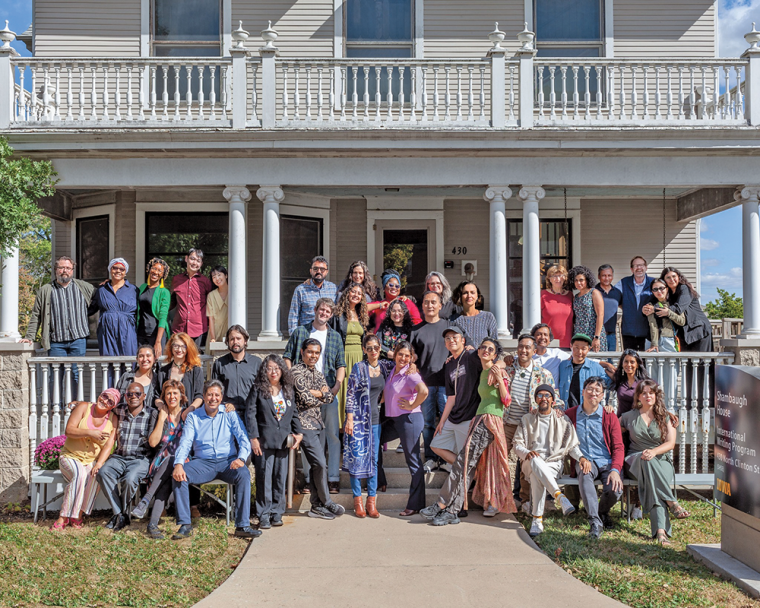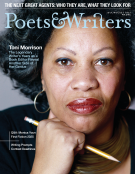In 1967, Paul Engle, longtime director of the world-renowned Iowa Writers’ Workshop, along with Chinese novelist Hualing Nieh Engle, cofounded the International Writing Program (IWP), a residency for international artists that would provide a haven in Iowa City for talented writers who might be facing severe restrictions to literary and personal freedoms within their home countries. Over the past fifty-eight years, the IWP, which serves as a kind of global counterpart to the Iowa Writers’ Workshop, has become one of the most prestigious cultural exchanges of its kind. The residency has hosted more than 1,600 writers from over 160 countries, including three Nobel Prize winners, most recently 2024 honoree Han Kang. In 2000, poet and journalist Christopher Merrill became director of the IWP, and under his leadership, the program added robust initiatives that complemented the original residency. The Lines & Spaces exchange sends American writers to regions with relatively little history of literary liaisons, including South Sudan and, most recently, Saudi Arabia. Between the Lines brings high school students from around the world to campus for two weeks of intensive workshops. Digital offerings such as Massive Open Online Courses invite thousands more writers and readers into the community. As Pakistani author and 2024 IWP Fellow Sabyn Javeri puts it, “The IWP is more than a program—it’s a bridge, a sanctuary, a meeting place for the world’s stories.”

The 2024 cohort and administrators of the International Writing Program in Iowa City. (Credit: Barry Phipps)
All of that changed on February 26. Since its beginnings, the IWP has enjoyed a special relationship with the U.S. Department of State, with at least half its funding coming from the Bureau of Educational and Cultural Affairs. But the current Trump administration terminated the bureau’s multiple grants with the IWP, resulting in the loss of funding worth nearly a million dollars. The IWP was forced to cancel Between the Lines, Lines & Spaces, and all Digital Learning initiatives for the foreseeable future. “Programs for Ukrainian writers working with young Ukrainians, Burmese writers, mentorships for young writers in really challenging circumstances—all out the window,” Merrill says. The cuts also wipe out the resources to help connect future artists to the university, because the budgets of the offices facilitating those liaisons have been slashed. The State Department’s announcement hasn’t completely felled the IWP—thanks to help from private donors, fund-raising, and the university, the fall residency will continue but with roughly half the size of the planned cohort of thirty authors. But the blow is significant.
“The end of this era seems to signal the end of an era for America,” says Macedonian writer Rumena Bužarovska, who attended the IWP in 2018. “Not only is this devastating, but it is also extremely frightening. It signals the end of education, of thought, of freedom, of collaboration. It is the triumph of borders; it is a triumph of war.”
The IWP has facilitated countless creative connections among residents, throughout the university and worldwide. Through Between the Lines, the IWP’s program for high school students, Bužarovska and another IWP fellow, the German translator Rasha Khayat, connected with Afghan students to teach creative writing to girls in Afghanistan. Javeri collaborated with the university’s dance and theater arts departments to adapt some of her stories into performance pieces. “On a personal level,” Javeri says, “I left Iowa feeling more rooted in my creative identity—confident not just as a writer, but as a literary citizen.”
Merrill says that he could see the writing on the wall as soon as the current Trump administration entered office. “We’ve never actually received any reason why we were terminated, except that we were,” he adds. Ironically, the State Department demands programs it funds to do three things—“make America safer, stronger, and more prosperous”—which aligns precisely with the IWP’s mission, says Merrill. Artistic exchange makes America safer because writers leave the University of Iowa with, as Merrill puts it, “a more nuanced understanding of this country.” The IWP also makes the United States stronger, since it develops allies and deepens ties abroad. And the program makes America prosperous: So many writers who have come through the University of Iowa’s programs go on to write lucrative and lauded books, movies, and television shows. “We led the charge for Iowa City to become the first UNESCO City of Literature in North America,” says Merrill. “Isn’t that what the creative economy is all about?”
Micah Bateman, an assistant professor in the School of Library and Information Science at the University of Iowa and an Iowa Writers’ Workshop graduate, worked with the IWP to deliver the University of Iowa’s first Massive Open Online Courses and had, before the defunding, been planning a grant application to connect IWP’s fall residents with regional writers in libraries. “It’s ironic to me now,” Bateman says, “that there is state legislation in the works here to found a University of Iowa School of Intellectual Freedom at the same time that the IWP—the campus center most directly fostering global intellectual freedom—is fighting for its life.”
Merrill draws inspiration from the many residents of the IWP who have found a way to keep working despite oppression and who persist in making art under authoritarian regimes. “So many of the writers who I just treasure, who were in our program, who often came from difficult places,” he says, “I’m keeping them uppermost in mind as I imagine what my role is, what our role is, the ways in which we can respond to this moment.” Despite the setbacks, Merrill refuses to give up. “Within two minutes of receiving that news I thought, ‘We’re going to continue. We’re going to find some way to keep this going.’”
Adrienne Raphel is the author of Our Dark Academia (Rescue Press, 2022), Thinking Inside the Box: Adventures With Crosswords and the Puzzling People Who Can’t Live Without Them (Penguin Press, 2020), and What Was It For (Rescue Press, 2017). She teaches at CUNY and lives in Brooklyn, New York.








